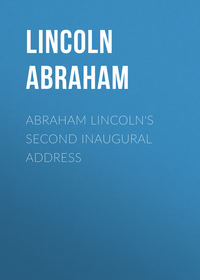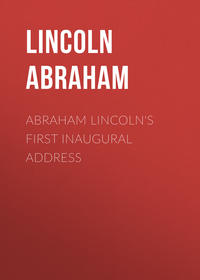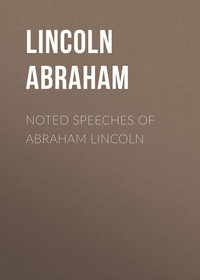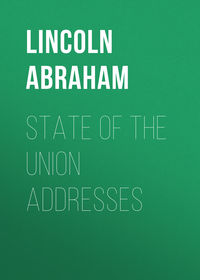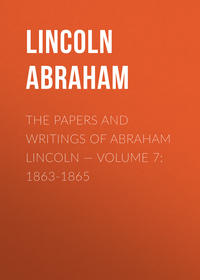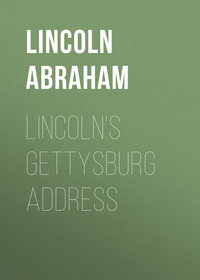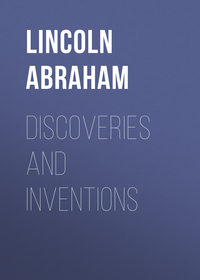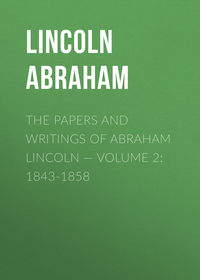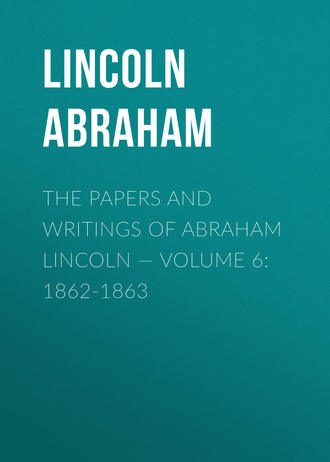 полная версия
полная версияThe Papers And Writings Of Abraham Lincoln — Volume 6: 1862-1863
A. LINCOLN.
TELEGRAM TO W. S. ROSECRANS
[Cipher.]WAR DEPARTMENT, October 12, 1863.8.35 A.M.
MAJOR-GENERAL ROSECRANS, Chattanooga, Term.:
As I understand, Burnside is menaced from the west, and so cannot go to you without surrendering East Tennessee. I now think the enemy will not attack Chattanooga, and I think you will have to look out for his making a concentrated drive at Burnside. You and Burnside now have him by the throat, and he must break your hold or perish I therefore think you better try to hold the road up to Kingston, leaving Burnside to what is above there. Sherman is coming to you, though gaps in the telegraph prevent our knowing how far he is advanced. He and Hooker will so support you on the west and northwest as to enable you to look east and northeast. This is not an order. General Halleck will give his views.
A. LINCOLN.
TELEGRAM TO GENERAL G. G. MEADE
WASHINGTON, October 12, 1863. 9 A.MMAJOR-GENERAL MEADE: What news this morning? A despatch from Rosecrans, leaving him at 7.30 P.M. yesterday, says:
"Rebel rumors that head of Ewell's column reached Dalton yesterday."
I send this for what it is worth.
A. LINCOLN.
TELEGRAM TO WAYNE McVEIGH
EXECUTIVE MANSION, WASHINGTON, October 13, 1863McVEIGH, Philadelphia:
The enemy some days ago made a movement, apparently to turn General Meade's right. This led to a maneuvering of the two armies and to pretty heavy skirmishing on Saturday, Sunday, and Monday. We have frequent despatches from General Meade and up to 10 o'clock last night nothing had happened giving either side any marked advantage. Our army reported to be in excellent condition. The telegraph is open to General Meade's camp this morning, but we have not troubled him for a despatch.
A. LINCOLN.
TO THURLOW WEED
EXECUTIVE MANSION, WASHINGTON, October 14, 1863HON. THURLOW WEED.
DEAR SIR: — I have been brought to fear recently that somehow, by commission or omission, I have caused you some degree of pain. I have never entertained an unkind feeling or a disparaging thought toward you; and if I have said or done anything which has been construed into such unkindness or disparagement, it has been misconstrued. I am sure if we could meet we would not part with any unpleasant impression On either side.
Yours as ever,
A. LINCOLN.
TO L. B. TODD
WAR DEPARTMENT, WASHINGTON, D. C., October 15, 1863L. B. TODD, Lexington, Ky.:
I send the following pass to your care.
A. LINCOLN.
AID TO MRS. HELM, MRS. LINCOLN'S SISTER
WASHINGTON, D. C.. October 15, 1863To WHOM IT MAY CONCERN:
Allow MRS. Robert S. Todd, widow, to go south and bring her daughter, MRS. General B. Hardin Helm, with her children, north to Kentucky.
A. LINCOLN.
TELEGRAM TO GENERAL FOSTER
WAR DEPARTMENT, WASHINGTON, D. C., October 15, 1863MAJOR-GENERAL FOSTER, Fort Monroe, Va.:
Postpone the execution of Dr. Wright to Friday the 23d instant (October). This is intended for his preparation and is final.
A. LINCOLN.
TELEGRAM TO GENERAL MEADE
EXECUTIVE MANSION, WASHINGTON, October 15, 1863MAJOR-GENERAL MEADE, Army of Potomac:
On the 4th instant you telegraphed me that Private Daniel Hanson, of Ninety-seventh New York Volunteers, had not yet been tried. When he shall be, please notify me of the result, with a brief statement of his case, if he be convicted. Gustave Blittersdorf, who you say is enlisted in the One hundred and nineteenth Pennsylvania Volunteers as William Fox, is proven to me to be only fifteen years old last January. I pardon him, and you will discharge him or put him in the ranks at your discretion. Mathias Brown, of Nineteenth Pennsylvania Volunteers, is proven to me to be eighteen last May, and his friends say he is convicted on an enlistment and for a desertion both before that time. If this last be true he is pardoned, to be kept or discharged as you please. If not true suspend his execution and report the facts of his case. Did you receive my despatch of 12th pardoning John Murphy?
A. LINCOLN.
[The Lincoln papers during this time have a suspended execution on almost every other page, I have omitted most of these D.W.]
TELEGRAM TO T. W. SWEENEY
WAR DEPARTMENT, WASHINGTON, D. C., October 16, 1863THOMAS W. SWEENEY, Continental, Philadelphia:
Tad is teasing me to have you forward his pistol to him.
A. LINCOLN.
TELEGRAM TO T. C. DURANT
WASHINGTON, D. C., October 16, 1863T. C. DURANT, New York:
I remember receiving nothing from you of the 10th, and I do not comprehend your despatch of to-day. In fact I do not remember, if I ever knew, who you are, and I have very little conception as to what you are telegraphing about.
A. LINCOLN.
COMMENT ON A NOTE
NEW YORK, October 15, 1863DEAR SIR: On the point of leaving I am told, by a gentleman to whose statements I attach credit, that the opposition policy for the Presidential campaign will be to "abstain from voting." J.
[Comment.]
More likely to abstain from stopping, once they get at it, until they shall have voted several times each.
October 16. A. L.
TO GENERAL H. W. HALLECK
EXECUTIVE MANSION, WASHINGTON, October 16, 1863MAJOR GENERAL HALLECK:
I do not believe Lee can have over 60,000 effective men.
Longstreet's corps would not be sent away to bring an equal force back upon the same road; and there is no other direction for them to have come from.
Doubtless, in making the present movement, Lee gathered in all available scraps, and added them to Hill's and Ewell's corps; but that is all, and he made the movement in the belief that four corps had left General Meade; and General Meade's apparently avoiding a collision with him has confirmed him in that belief. If General Meade can now attack him on a field no worse than equal for us, and will do so now with all the skill and courage which he, his officers, and men possess, the honor will be his if he succeeds, and the blame may be mine if he fails.
Yours truly,
A. LINCOLN.
CALL FOR 300,000 VOLUNTEERS, OCTOBER 17, 1863
BY THE PRESIDENT OF THE UNITED STATES OF AMERICA:A Proclamation.
Whereas the term of service of a part of the Volunteer forces of the United States will expire during the coming year; and whereas, in addition to the men raised by the present draft, it is deemed expedient to call out three hundred thousand volunteers to serve for three years or during the war, not, however, exceeding three years:
Now, therefore, I, Abraham Lincoln, President of the United States, and Commander-in-Chief of the Army and Navy thereof, and of the militia of the several States when called into actual service, do issue this my proclamation, calling upon the governors of the different States to raise, and have enlisted into the United States service, for the various companies and regiments in the field from their respective States, the quotas of three hundred thousand men.
I further proclaim that all the volunteers thus called out and duly enlisted shall receive advance pay, premium, and bounty, as heretofore communicated to the governors of States by the War Department through the Provost-Marshal-General's office, by special letters.
I further proclaim that all volunteers received under this call, as well as all others not heretofore credited, shall be duly credited and deducted from the quotas established for the next draft.
I further proclaim that if any State shall fail to raise the quota assigned to it by the War Department under this call, then a draft for the deficiency in said quota shall be made in said State, or in the districts of said State, for their due proportion of said quota, and the said draft shall commence on the 5th day of January, 1864.
And I further proclaim that nothing in this proclamation shall interfere with existing orders, or with those which may be issued for the present draft in the States where it is now in progress, or where it has not yet been commenced.
The quotas of the States and districts will be assigned by the War Department through the Provost-Marshal-General's office, due regard being had for the men heretofore furnished, whether by volunteering or drafting; and the recruiting will be conducted in accordance with such instructions as have been or may be issued by that department.
In issuing this proclamation, I address myself not only to the governors of the several States, but also to the good and loyal people thereof, invoking them to lend their cheerful, willing, and effective aid to the measures thus adopted, with a view to reinforce our victorious army now in the field, and bring our needful military operations to a prosperous end, thus closing forever the fountains of sedition and civil war.
In witness whereof, I have hereunto set my hand and caused the seal of the United States to be affixed.........
A. LINCOLN.
By the President: WILLIAM H. SEWARD, Secretary of State.
TELEGRAM TO GENERAL FOSTER
WAR DEPARTMENT, WASHINGTON, D.C., October 17, 1863MAJOR-GENERAL FOSTER, Port Monroe, Va.:
It would be useless for Mrs. Dr. Wright to come here. The subject is a very painful one, but the case is settled.
A. LINCOLN.
TELEGRAM TO W. B. THOMAS
EXECUTIVE MANSION, WASHINGTON, D.C., OCTOBER 17, 1863HON. WILLIAM B. THOMAS, Philadelphia, Pa.
I am grateful for your offer of 100,000 men, but as at present advised I do not consider that Washington is in danger, or that there is any emergency requiring 60 or 90 days men.
A. LINCOLN.
TELEGRAM TO J. WILLIAMS AND N. G. TAYLOR
WAR DEPARTMENT, October 17, 1863JOHN WILLIAMS AND N G. TAYLOR, Knoxville, Tenn.:
You do not estimate the holding of East Tennessee more highly than I do. There is no absolute purpose of withdrawing our forces from it, and only a contingent one to withdraw them temporarily for the purpose of not losing the position permanently. I am in great hope of not finding it necessary to withdraw them at all, particularly if you raise new troops rapidly for us there.
A. LINCOLN.
TELEGRAM TO T. C. DURANT
EXECUTIVE MANSION, WASHINGTON CITY, October 18, 1863T. C. DURANT, New York:
As I do with others, so I will try to see you when you come.
A. LINCOLN.
TELEGRAM TO GENERAL W. S. ROSECRANS
WAR DEPARTMENT, October 19, 1863.9. A.MMAJOR-GENERAL ROSECRANS, Chattanooga, Tenn:
There has been no battle recently at Bull Run. I suppose what you have heard a rumor of was not a general battle, but an "affair" at Bristow Station on the railroad, a few miles beyond Manassas Junction toward the Rappahannock, on Wednesday, the 14th. It began by an attack of the enemy upon General Warren, and ended in the enemy being repulsed with a loss of four cannon and from four to seven hundred prisoners.
A. LINCOLN.
TELEGRAM TO GENERAL R. C. SCHENCK
EXECUTIVE MANSION, WASHINGTON, October 21, 1863.2.45MAJOR-GENERAL SCHENCK, Baltimore, Md.:
A delegation is here saying that our armed colored troops are at many, if not all, the landings on the Patuxent River, and by their presence with arms in their hands are frightening quiet people and producing great confusion. Have they been sent there by any order, and if so, for what reason?
A. LINCOLN.
TELEGRAM TO GENERAL R. C. SCHENCK
EXECUTIVE MANSION, WASHINGTON, October 22, 1863.1.30 P.MMAJOR-GENERAL SCHENCK, Baltimore, Md.:
Please come over here. The fact of one of our officers being killed on the Patuxent is a specimen of what I would avoid. It seems to me we could send white men to recruit better than to send negroes and thus inaugurate homicides on punctilio.
Please come over.
A. LINCOLN.
TO GENERAL H. W. HALLECK
EXECUTIVE MANSION, WASHINGTON, October 24, 1863MAJOR-GENERAL HALLECK:
Taking all our information together, I think it probable that Ewell's corps has started for East Tennessee by way of Abingdon, marching last Monday, say from Meade's front directly to the railroad at Charlottesville.
First, the object of Lee's recent movement against Meade; his destruction of the Alexandria and Orange Railroad, and subsequent withdrawal without more motive, not otherwise apparent, would be explained by this hypothesis.
Secondly, the direct statement of Sharpe's men that Ewell has gone to Tennessee.
Thirdly, the Irishman's [Northern Spy in Richmond] statement that he has not gone through Richmond, and his further statement of an appeal made to the people at Richmond to go and protect their salt, which could only refer to the works near Abingdon.
Fourthly, Graham's statement from Martinsburg that Imboden is in retreat for Harrisonburg. This last matches with the idea that Lee has retained his cavalry, sending Imboden and perhaps other scraps to join Ewell. Upon this probability what is to be done?
If you have a plan matured, I have nothing to say. If you have not, then I suggest that, with all possible expedition, the Army of the Potomac get ready to attack Lee, and that in the meantime a raid shall, at all hazards, break the railroad at or near Lynchburg.
Yours truly,
A. LINCOLN.
TO E. B. WASHBURNE
(Private and Confidential.)EXECUTIVE MANSION, WASHINGTON, October 26, 1863.
HON. E. B. WASHBURNE.
MY DEAR SIR: — Yours of the 12th has been in my hands several days. Inclosed I send the leave of absence for your brother, in as good form as I think I can safely put it. Without knowing whether he would accept it. I have tendered the collectorship at Portland, Maine, to your other brother, the governor.
Thanks to both you and our friend Campbell for your kind words and intentions. A second term would be a great honor and a great labor, which, together, perhaps I would not decline if tendered.
Yours truly,
A. LINCOLN.
TO SECRETARY CHASE
EXECUTIVE MANSION, WASHINGTON, October 26, 1863HON. SECRETARY OF THE TREASURY.
MY DEAR SIR: — The writer of the accompanying letter is one of Mrs. Lincoln's numerous cousins. He is a grandson of "Milliken's Bend," near Vicksburg — that is, a grandson of the man who gave name to Milliken's Bend. His father was a brother to MRS. Lincoln's mother. I know not a thing about his loyalty beyond what he says. Supposing he is loyal, can any of his requests be granted, and if any, which of them?
Yours truly,
A. LINCOLN.


